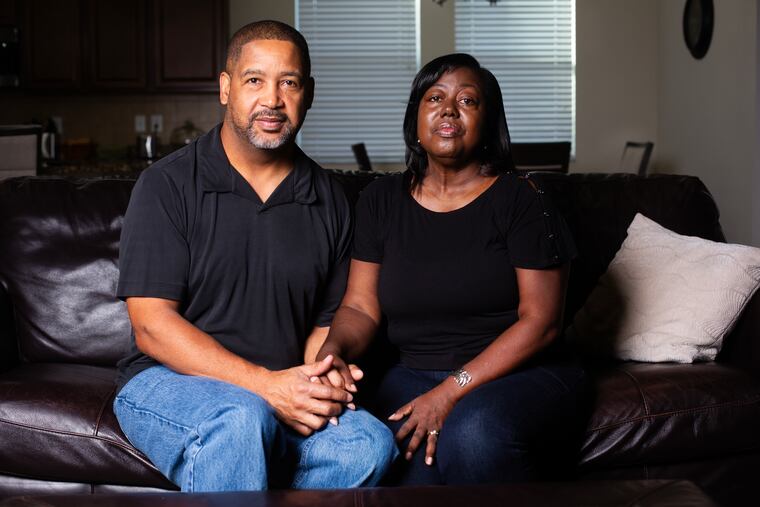Family whose son died after first day of football practice sues Bucknell University
The family said CJ Dickey’s death could have been avoided.

The parents of an 18-year-old, who died two days after his first football practice at Bucknell University, have filed a wrongful-death lawsuit against the school.
Calvin Dickey Sr. and Nicole Dickey allege that the university, its president, and members of its athletics department failed to follow NCAA guidelines meant to keep student-athletes with sickle cell trait safe, and in doing so caused the death of their son, CJ Dickey.
The suit also alleges that Bucknell’s athletic instructors violated Pennsylvania’s anti-hazing laws by pushing CJ until he passed out on his first day of practice, “not as part of reasonable and customary training, but as part of an unnecessary ritual of initiation.”
“As parents, I think Bucknell owes us an explanation,” said Calvin Dickey, his voice on the edge of tears, at a news conference in Philadelphia after filing the lawsuit.
Bucknell said that “the death of a student is always a tragic loss” and that it would not comment on pending litigation.
“We again extend heartfelt sympathies to CJ’s family, and we will continue to focus on our most important priority — the health and safety of all Bucknell students," a spokesperson for the school said.
Bucknell recruited CJ, an affable high achiever who loved baseball and football, to be an offensive lineman on its Division I football team.
As part of his required medical evaluation before joining the Bison, CJ tested positive for sickle cell trait, which means he inherited a sickle cell gene from one parent.
The trait can make intense exercise dangerous in certain situations, triggering a condition called exertional sickling. That condition causes the body’s red blood cells to convert from their traditional round shape into hook-shaped sickles, blocking the bloodstream, preventing the flow of oxygen, and causing organ failure.
In July, two days after he collapsed at his first day of football practice, Dickey suffered an agonizing death from rhabdomyolysis, or muscle breakdown, related to sickle cell trait.
» READ MORE: Their son died after his first day of football practice at Bucknell. They want answers.
Doctors and sports medicine experts say sickle cell trait should not be a death sentence. It used to be the leading cause of death in college football, but the rate of death associated with it among Division I football players dropped by nearly 90% after the NCAA began requiring testing and education in 2010, according to a report published in Sports Health Journal.
The NCAA guidelines say coaches should allow student athletes to set their own pace, build up slowly while training, and rest and recover between intense bouts of exercise. Bucknell did not follow those guidelines, the lawsuit says.
Instead, on the afternoon of his first football practice, CJ was required to do 100 up-downs, an exercise that involves doing a pushup and jumping back up into a squat.
CJ fell behind — a red flag for someone with sickle cell trait, according to sports doctors. But the strength and training coach who was running the workout, Mark Kulbis, did nothing to assist him, the lawsuit said. Kulbis did not immediately respond to The Inquirer’s request for comment.
Dickey then collapsed. Bucknell did not have a trainer present in the area where he was working out, and did not have an emergency action plan for medical events, which “caused confusion and delay in providing assistance to CJ,” the lawsuit said. Both are violations of NCAA rules.
Bucknell has not shared much detail about the football practice or the circumstances that led to CJ’s collapse and death because the family refuses to sign a nondisclosure agreement, said Mike Caspino, an attorney representing the Dickey family.
After the collapse, a Bucknell athletic trainer called the Dickeys to tell them to come to the local hospital in Lewisburg, where CJ was awake but suffering.
“No parent, absolutely no parent ever, wants to get that call,” Nicole Dickey said.
Over the next two days, CJ rapidly became sicker and sicker: his kidneys failed, his calves and arms swelled until he needed painful surgery, and finally his heart stopped multiple times.
Three months later, another freshman offensive lineman suffered rhabdomyolysis as well, the suit said. (In athletes who don’t have the sickle cell trait, it’s unlikely to be fatal.)
The Dickeys say they filed the lawsuit because they want to know exactly what happened to their son, and make sure it never happens again.
“We don’t want another athlete, another family, another brother, another cousin, to go through this type of agony,” said Calvin Dickey.